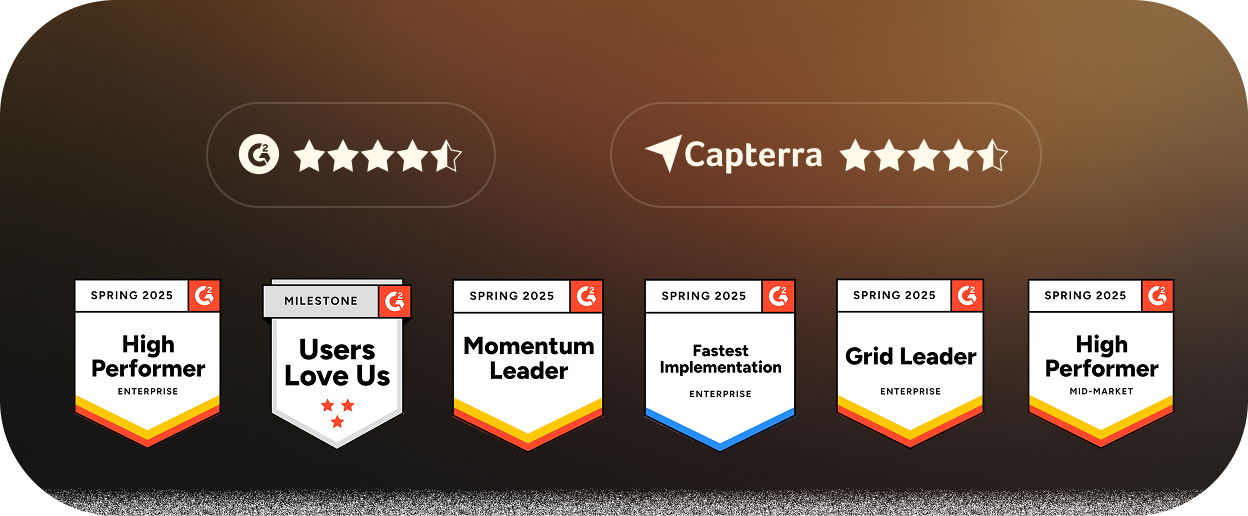
Istilah Glosari
Plum - Ganjaran, Insentif dan Platform Pembayaran
Ganjaran Acara
Ganjaran acara merujuk kepada insentif, faedah atau hadiah yang ditawarkan kepada peserta atau peserta semasa pelbagai acara. Ganjaran ini boleh terdiri daripada item ketara seperti barangan dan kad hadiah kepada ganjaran tidak ketara seperti akses eksklusif ke kawasan VIP atau peluang untuk rangkaian.
Program ganjaran acara direka untuk meningkatkan penglibatan peserta, menggalakkan penyertaan dan mencipta pengalaman yang tidak dapat dilupakan untuk semua yang terlibat. Dengan menawarkan ganjaran yang menarik, penganjur acara menyasarkan untuk meningkatkan kehadiran, membina kesetiaan jenama dan memupuk reputasi positif untuk acara mereka.
Apakah ganjaran acara?
Ganjaran acara ialah insentif atau hadiah yang diberikan kepada peserta semasa atau selepas acara untuk mengiktiraf kehadiran, penglibatan atau pencapaian. Ganjaran ini boleh terdiri daripada kad hadiah digital dan barangan berjenama kepada kandungan eksklusif, pengalaman atau tawaran diskaun.
Ia biasanya digunakan dalam acara korporat, pameran perdagangan, webinar, persidangan, pelancaran produk dan acara pasukan dalaman untuk meningkatkan kepuasan peserta dan menggalakkan penyertaan.
Apakah faedah ganjaran acara?
Ganjaran acara memainkan peranan penting dalam meningkatkan penglibatan, meningkatkan kepuasan peserta dan mengukuhkan tingkah laku yang diingini. Kepentingan mereka termasuk:
- Kehadiran lebih tinggi : Ganjaran menggalakkan lebih ramai orang mendaftar dan hadir untuk acara tersebut.
- Penglibatan yang lebih baik : Peserta lebih berkemungkinan untuk mengambil bahagian dalam sesi, tinjauan pendapat atau aktiviti apabila ganjaran terlibat.
- Kepuasan yang dipertingkatkan : Menawarkan ganjaran membuatkan peserta berasa dihargai dan meningkatkan pengalaman acara mereka.
- Pengingatan jenama yang lebih kukuh: Ganjaran berjenama membantu peserta mengingati acara dan syarikat di belakangnya.
- Tingkah laku terpandu : Ganjaran boleh mempengaruhi peserta untuk menyelesaikan tindakan utama, seperti melawat gerai atau rangkaian.
- Penguatan sosial : Insentif untuk perkongsian dalam talian meningkatkan keterlihatan acara dan menarik peserta baharu.
- Pengumpulan data yang lebih baik : Ganjaran mendorong peserta untuk memberikan maklum balas atau tinjauan yang lengkap.
- Kesetiaan selepas acara : Pengalaman yang bermanfaat membina hubungan yang lebih kukuh dan menggalakkan penglibatan masa hadapan.
- Memotivasikan penyertaan: Peserta lebih cenderung untuk mendaftar, menghadiri dan berinteraksi apabila ganjaran terlibat.
- Rujukan yang menggalakkan: Menawarkan ganjaran untuk membawa hadir peserta lain boleh meluaskan jangkauan acara secara organik.
Apakah jenis ganjaran yang boleh digunakan pada acara?
Jenis ganjaran biasa dalam ganjaran acara termasuk:
- Barangan Swag : Barang niaga berjenama seperti kemeja-t, tote atau pen berfungsi sebagai kenang-kenangan praktikal untuk hadirin.
- Pengalaman VIP : Ganjaran mungkin termasuk akses ruang istirahat, temu ramah atau tempat duduk yang ditempah untuk pengalaman acara premium.
- Peningkatan atau diskaun : Peserta mungkin menerima peningkatan tiket, diskaun acara masa hadapan atau tawaran harga awal.
- Pengiktirafan dan sijil : Sijil atau lencana digital mengiktiraf penyertaan atau penglibatan yang menonjol semasa acara.
- Akses atau keistimewaan khas : Ganjaran boleh termasuk akses ke kawasan eksklusif, selepas pesta atau sesi rangkaian peribadi.
Apakah beberapa strategi yang berkesan untuk melaksanakan program ganjaran acara?
Beberapa strategi berkesan untuk melaksanakan program ganjaran acara ialah:
- Fahami keutamaan peserta : Gunakan tinjauan atau penyelidikan untuk mengenal pasti ganjaran yang sejajar dengan minat peserta dan menyesuaikan tawaran dengan sewajarnya.
- Tetapkan matlamat yang boleh diukur : Tentukan objektif yang jelas seperti meningkatkan penglibatan atau mengumpul maklum balas untuk mengukur kejayaan program dengan berkesan.
- Promosikan program ganjaran : Gunakan saluran seperti media sosial, e-mel dan tapak web acara untuk meningkatkan kesedaran dan mendorong penyertaan.
Apakah cabaran biasa dalam menguruskan program ganjaran acara?
Menguruskan ganjaran acara dengan berkesan memerlukan perancangan yang teliti. Cabaran biasa termasuk:
- Inventori dan logistik: Untuk ganjaran fizikal, mengurus stok dan memastikan penghantaran tepat pada masanya boleh menjadi rumit, terutamanya untuk acara hibrid atau global.
- Kekangan belanjawan: Menyediakan ganjaran yang bermakna sambil mengekalkan belanjawan memerlukan pemilihan dan penyumberan strategik.
- Pengurusan penebusan: Penjejakan siapa yang menerima ganjaran dan memastikan penebusan yang betul (terutama untuk ganjaran digital) memerlukan penyelarasan yang lancar.
- Ketepatan data: Mengumpul dan mengurus data peserta untuk pengagihan ganjaran mestilah tepat dan selamat.
- Penglibatan peserta: Jika ganjaran tidak dianggap sebagai berharga atau relevan, ia mungkin tidak mendorong penyertaan atau kepuasan yang dimaksudkan.
Adakah terdapat sebarang pertimbangan cukai atau pematuhan untuk memberikan ganjaran acara?
Ya, pertimbangan cukai dan pematuhan adalah penting apabila mengeluarkan ganjaran acara. Berikut adalah perkara utama:
- Pendapatan boleh cukai: Dalam banyak bidang kuasa, ganjaran, terutamanya setara tunai seperti kad hadiah boleh dianggap sebagai pendapatan boleh cukai untuk penerima.
- Kewajipan melaporkan: Perniagaan mungkin dikehendaki melaporkan nilai ganjaran yang diberikan, terutamanya untuk insentif bernilai lebih tinggi atau penerima pekerja.
- Peraturan tempatan: Program ganjaran mesti mematuhi undang-undang promosi tempatan, termasuk had nilai hadiah atau keperluan pelesenan loteri.
- Privasi data: Mengumpul maklumat peribadi untuk pengagihan ganjaran mesti selaras dengan peraturan perlindungan data seperti GDPR atau CCPA.
Untuk memastikan pematuhan penuh, syarikat harus berunding dengan profesional perundangan atau cukai apabila merancang inisiatif ganjaran berskala besar atau bernilai tinggi.
















